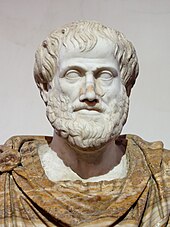Before the invention or discovery of the concept of "nature" (ancient Greek phusis) by the Pre-Socratic philosophers, the same words tend to be used to describe the natural "way" in which a plant grows,[16] and the "way" in which, for example, one tribe worships a particular god. For this reason, it is claimed these men were the first philosophers in the strict sense, and also the first people to clearly distinguish "nature" and "convention."[17]: p.209 Science was therefore distinguished as the knowledge of nature and things which are true for every community, and the name of the specialized pursuit of such knowledge was philosophy — the realm of the first philosopher-physicists. They were mainly speculators or theorists, particularly interested in astronomy. In contrast, trying to use knowledge of nature to imitate nature (artifice or technology, Greek technē) was seen by classical scientists as a more appropriate interest for lower class artisans.[18] A clear-cut distinction between formal (eon) and empirical science (doxa) was made by the pre-Socratic philosopher Parmenides (fl. late sixth or early fifth century BCE). Although his work Peri Physeos (On Nature) is a poem, it may be viewed as an epistemological essay on method in natural science. Parmenides' ἐὸν may refer to a formal system or calculus which can describe nature more precisely than natural languages. "Physis" may be identical to ἐὸν.[19]
Aristotle, 384 BCE – 322 BCE, one of the early figures in the development of the scientific method[20]
Aristotle maintained the sharp distinction between science and the practical knowledge of artisans, treating theoretical speculation as the highest type of human activity, practical thinking about good living as something less lofty, and the knowledge of artisans as something only suitable for the lower classes. In contrast to modern science, Aristotle's influential emphasis was upon the "theoretical" steps of deducing universal rules from raw data and did not treat the gathering of experience and raw data as part of science itself.[nb 5]

No comments:
Post a Comment